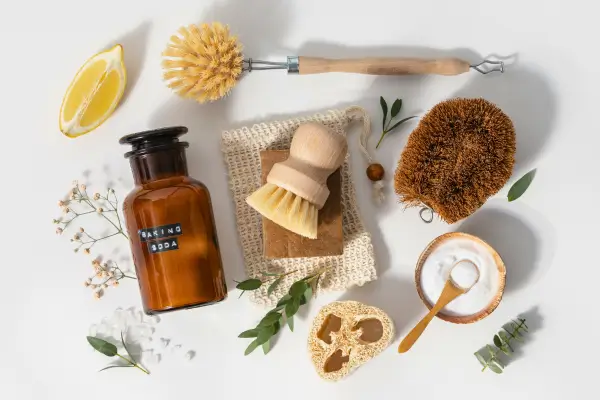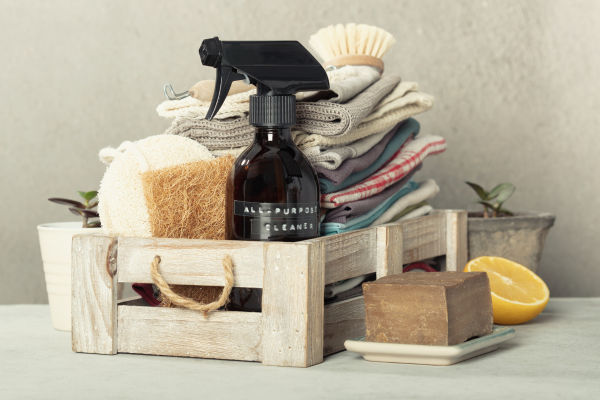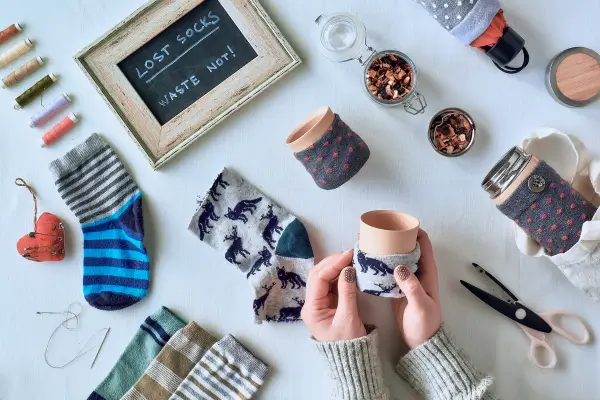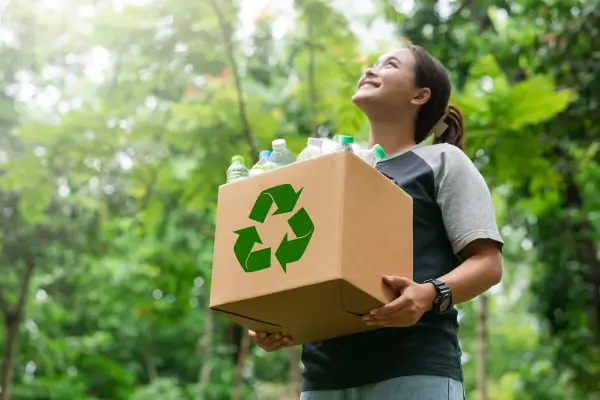Growing concern about conventional cleaning products
In recent years, there has been a growing awareness of the impact that conventional cleaning products have on both our health and the environment. Many household cleaners contain harmful chemicals that can cause respiratory issues, skin irritation, and other health problems. Additionally, these products often contribute to environmental pollution, contaminating our water supplies and harming wildlife.
Focus on eco-friendly cleaning hacks
In response to these concerns, more people are turning to eco-friendly cleaning solutions that are both effective and safe. This article will share practical, natural, and cost-effective cleaning hacks to help you maintain a clean and sustainable home. By making simple changes to your cleaning routine, you can protect your health, reduce your environmental footprint, and even save money.
The goal of this article is to provide you with a comprehensive guide to eco-friendly cleaning hacks. Whether you’re looking to reduce your exposure to harmful chemicals, cut down on waste, or simply find more affordable cleaning solutions, we’ve got you covered. From essential ingredients and DIY recipes to room-by-room cleaning tips, you’ll find everything you need to create a healthier, more sustainable home.
Why choose eco-friendly cleaning products?
Environmental impact
Conventional cleaning products often contain a plethora of chemicals that can harm the environment. When these products are washed down the drain, they enter our water systems and can cause significant pollution. Chemicals such as phosphates, surfactants, and various artificial fragrances contribute to water pollution, harming aquatic life and disrupting ecosystems. For instance, phosphates, commonly found in laundry detergents, can lead to the overgrowth of algae in water bodies, a phenomenon known as eutrophication, which depletes oxygen and kills marine life. By opting for eco-friendly cleaning products, you can significantly reduce your household’s contribution to this environmental degradation.
Health benefits
Switching to eco-friendly cleaning products can also provide substantial health benefits. Many conventional cleaners contain volatile organic compounds (VOCs), which can cause respiratory issues, skin irritation, and other health problems. According to the Environmental Protection Agency (EPA), exposure to VOCs can lead to headaches, dizziness, and long-term health effects such as liver and kidney damage. Eco-friendly cleaners, on the other hand, are made from natural ingredients that are safe for both you and your family. Ingredients like vinegar, baking soda, and essential oils clean effectively without releasing harmful toxins into your home environment.
Cost savings
In addition to being safer for your health and the environment, eco-friendly cleaning products can also save you money. Many natural cleaning solutions can be made at home using simple, inexpensive ingredients. For example, a mixture of vinegar and water can serve as an all-purpose cleaner, and baking soda can be used as a scrubbing agent. These DIY solutions are often more cost-effective than store-bought cleaners. Moreover, because natural cleaning products are typically less harsh, they can extend the lifespan of your home surfaces and appliances, saving you money on repairs and replacements in the long run.
Choosing eco-friendly cleaning products helps protect the environment, improves your health, and can even be more economical. This shift towards sustainable cleaning practices benefits not just your household but also the broader community and planet.
Essential eco-friendly cleaning ingredients
White vinegar
White vinegar is a powerhouse when it comes to eco-friendly cleaning. Its acidity makes it effective at cutting through grease, dissolving mineral deposits, and killing certain bacteria and viruses. It’s ideal for cleaning glass, countertops, and bathrooms. To use white vinegar as a cleaner, simply mix equal parts vinegar and water in a spray bottle. For tougher jobs, like removing lime scale, you can use undiluted vinegar. Its versatility and effectiveness make it a staple in natural cleaning.
Baking soda
Baking soda is another essential ingredient for eco-friendly cleaning. It’s a mild abrasive, making it perfect for scrubbing surfaces without scratching them. Baking soda also has natural deodorizing properties, which help neutralize odors. You can sprinkle baking soda on carpets before vacuuming, use it to scrub sinks and tubs, or combine it with vinegar to create a powerful foaming action for cleaning drains. Its non-toxic nature ensures it’s safe for use around children and pets.
Lemon juice
Lemon juice is not only refreshing but also a potent natural cleaner. It has antibacterial properties and a fresh scent that leaves your home smelling clean. Lemon juice is excellent for cutting through grease and removing stains. You can use it to clean cutting boards, deodorize garbage disposals, and remove soap scum. Mixing lemon juice with baking soda creates a paste that can tackle tough stains on surfaces.
Castile soap
Castile soap, made from vegetable oils, is a gentle yet effective cleaner suitable for various surfaces. It’s biodegradable and free from synthetic ingredients, making it an eco-friendly choice. Castile soap can be diluted with water to create a versatile all-purpose cleaner. It works well for mopping floors, washing dishes, and even as a hand soap. A little goes a long way, making it a cost-effective option.
Essential oils
Essential oils add fragrance and additional cleaning power to your homemade cleaners. Oils like tea tree, lavender, and eucalyptus have natural antibacterial and antifungal properties. A few drops of essential oil can be added to your vinegar or baking soda cleaning solutions to enhance their effectiveness and leave a pleasant scent. Not only do essential oils make your home smell wonderful, but they also boost the cleaning power of your DIY solutions.
These eco-friendly ingredients are not only effective but also safe for your family and the environment. Incorporating them into your cleaning routine is a simple step towards a more sustainable and healthy home.
DIY cleaning solutions
All-purpose cleaner
Creating your own all-purpose cleaner is easy and cost-effective. This versatile solution can be used on various surfaces, including countertops, appliances, and bathroom fixtures.
- Recipe: Mix equal parts white vinegar and water in a spray bottle. Add 10-15 drops of your favorite essential oil, such as tea tree or lavender, for added antibacterial properties and a pleasant scent.
- Instructions: Shake the bottle well before each use. Spray the solution on the surface and wipe it clean with a cloth. For tougher stains, let the solution sit for a few minutes before wiping.
Glass cleaner
A homemade glass cleaner can leave your windows and mirrors streak-free without the harsh chemicals found in commercial products.
- Recipe: Combine 1 cup of water, 1 cup of white vinegar, and 1 tablespoon of cornstarch in a spray bottle.
- Instructions: Shake the bottle to mix the ingredients thoroughly. Spray the solution onto the glass surface and wipe it clean with a lint-free cloth or newspaper. The cornstarch helps to prevent streaks and leaves the glass sparkling clean.
Bathroom cleaner
This powerful bathroom cleaner tackles soap scum, mildew, and grime without the need for toxic chemicals.
- Recipe: Mix 1/2 cup of baking soda with enough liquid castile soap to form a paste. Add 10 drops of tea tree essential oil for its antibacterial properties.
- Instructions: Apply the paste to surfaces like sinks, tubs, and tiles using a sponge or cloth. Scrub the area and rinse thoroughly with water. For tough stains, let the paste sit for 10-15 minutes before scrubbing and rinsing.
Floor cleaner
A natural floor cleaner is safe for various surfaces, including hardwood, tile, and laminate.
- Recipe: Combine 1/4 cup of white vinegar, 1 tablespoon of liquid castile soap, and 1 gallon of warm water in a bucket. Add 10 drops of lemon essential oil for a fresh scent.
- Instructions: Mix the solution well and mop the floor as usual. No need to rinse, as the solution leaves a clean, streak-free finish. For particularly dirty floors, you can increase the amount of castile soap.
These DIY cleaning solutions are not only effective but also safe for your family and the environment. By making your own cleaners, you can reduce your reliance on commercial products and promote a healthier, more sustainable home.
Room-by-room cleaning hacks
Kitchen
The kitchen is a hub of activity and often requires regular cleaning to maintain hygiene. Here are some eco-friendly hacks for a spotless kitchen:
- Countertops: For a natural cleaner, mix equal parts white vinegar and water in a spray bottle. Add a few drops of lemon essential oil for a fresh scent. Spray the solution on countertops and wipe with a clean cloth. This mixture is effective on most surfaces, but avoid using it on granite or marble.
- Appliances: To clean stainless steel appliances, dampen a cloth with white vinegar and wipe the surfaces. For stubborn spots, sprinkle baking soda on a damp cloth and gently scrub. Rinse with water and dry with a microfiber cloth for a streak-free shine.
- Sinks: Sprinkle baking soda in the sink and scrub with a sponge. For an extra boost, add a few drops of dish soap. Rinse thoroughly with water. To deodorize and clean the garbage disposal, grind a handful of ice cubes and citrus peels.
Bathroom
The bathroom can be a breeding ground for germs and mildew. Use these natural cleaning hacks to keep it fresh and clean:
- Tubs and showers: Create a paste with baking soda and water. Apply it to surfaces and scrub with a sponge. For tough stains, let the paste sit for 10-15 minutes before rinsing. To remove soap scum, spray white vinegar on the area, let it sit for a few minutes, and then scrub.
- Toilets: Pour a cup of baking soda into the toilet bowl, followed by a cup of white vinegar. Let the mixture sit for 10 minutes before scrubbing with a toilet brush. This combination helps to disinfect and remove stains.
- Mirrors: For a streak-free shine, spray a solution of equal parts water and white vinegar on mirrors and wipe with a lint-free cloth or newspaper.
Living room
The living room is a central space in the home where dust and dirt can accumulate. These hacks will help keep it clean:
- Dusting: Use a microfiber cloth dampened with a mixture of water and a few drops of essential oil to dust surfaces. This method traps dust effectively and leaves a pleasant scent.
- Upholstery: To freshen up upholstery, sprinkle baking soda on the fabric and let it sit for 15 minutes. Vacuum thoroughly to remove odors and dust.
- Carpets: For a natural carpet deodorizer, mix baking soda with a few drops of your favorite essential oil. Sprinkle the mixture on the carpet, let it sit for 15-30 minutes, and then vacuum.
Bedroom
A clean bedroom promotes better sleep and a healthier environment. Here are some eco-friendly tips:
- Bedding: Wash bedding regularly with an eco-friendly detergent. Add a cup of white vinegar to the rinse cycle to soften fabrics and remove any lingering odors.
- Mattresses: Sprinkle baking soda on the mattress, let it sit for 30 minutes, and then vacuum to remove dust mites and odors.
- Closets: Keep closets organized and clean by regularly decluttering. Use sachets filled with dried lavender or cedar chips to naturally repel moths and keep clothes smelling fresh.
These room-by-room cleaning hacks help maintain a clean and healthy home while minimizing the use of harmful chemicals.
Sustainable cleaning habits
Reduce single-use products
Minimizing the use of disposable cleaning products is a crucial step towards sustainable living. Single-use items like paper towels, plastic bottles, and disposable mop pads contribute significantly to landfill waste. Here are some tips to reduce reliance on these products:
- Cloth towels: Replace paper towels with reusable cloth towels or microfiber cloths. These can be washed and reused multiple times, reducing waste and saving money in the long run.
- Refillable bottles: Use glass or durable plastic spray bottles that can be refilled with homemade cleaning solutions. This practice cuts down on the plastic waste generated by single-use cleaning product containers.
- Reusable mop pads: Instead of disposable mop pads, opt for washable and reusable ones. They work just as well and can be cleaned and reused many times.
Reuse and repurpose
Incorporating reusability into your cleaning routine helps reduce waste and promotes sustainability. Here are a few ideas for reusing and repurposing items:
- Old clothes as rags: Cut up old T-shirts, towels, or other fabric items to use as cleaning rags. These work well for dusting, wiping down surfaces, and cleaning up spills.
- Glass jars: Repurpose glass jars from food products as storage containers for homemade cleaning solutions or for organizing small items around the house.
- DIY cleaning tools: Create your own cleaning tools, such as using a sock as a duster or making a scrubbing pad from mesh produce bags.
Composting waste
Composting biodegradable waste generated from cleaning activities can further reduce your environmental footprint. Here are some tips on how to compost effectively:
- Food scraps: Compost kitchen waste like fruit and vegetable peels, coffee grounds, and eggshells. These organic materials break down and enrich the soil.
- Paper products: Compost paper towels and other paper products used with non-toxic cleaning solutions. Make sure they are free from synthetic chemicals and dyes.
- Yard waste: Compost yard waste, such as leaves, grass clippings, and small branches, to create nutrient-rich compost for your garden.
Eco-friendly tools
Using sustainable cleaning tools made from eco-friendly materials can make a significant difference. Here are some recommendations:
- Bamboo scrub brushes: These brushes are durable, biodegradable, and made from renewable resources.
- Reusable mop pads: Opt for microfiber or washable cotton mop pads instead of disposable ones. They can be washed and reused, reducing waste.
- Natural sponges: Choose sponges made from natural materials, such as cellulose or loofah, instead of synthetic ones. They are biodegradable and better for the environment.
By adopting these sustainable cleaning habits, you can significantly reduce your household waste and contribute to a healthier planet. These practices not only benefit the environment but also promote a more mindful and intentional approach to everyday tasks.
Embrace eco-friendly cleaning for a sustainable home
Summing up the benefits
Throughout this article, we’ve explored the numerous advantages of adopting eco-friendly cleaning practices. From understanding the environmental and health impacts of conventional cleaners to discovering essential natural ingredients and DIY solutions, we’ve provided a comprehensive guide to sustainable cleaning. By making simple changes to your cleaning routine, you can create a healthier home environment, reduce your ecological footprint, and even save money in the long run.
Taking the first steps
Now that you’re equipped with practical tips and recipes, it’s time to take action. Start by incorporating some of the DIY cleaning solutions and eco-friendly habits into your daily routine. Small changes, like switching to reusable cleaning tools or making your own all-purpose cleaner, can have a significant impact over time. Remember, every little step counts towards a more sustainable lifestyle.
Reflecting on the bigger picture
Embracing eco-friendly cleaning is not just about making your home safer and more sustainable; it’s also about contributing to the well-being of our planet. By reducing the use of harmful chemicals and minimizing waste, you’re playing a part in protecting the environment for future generations. Sustainable cleaning practices help promote a more mindful and responsible approach to everyday tasks, fostering a healthier and more balanced way of living.
Making these eco-friendly changes in your cleaning routine allows you to enjoy a cleaner, healthier home while supporting the broader goal of environmental sustainability. Together, we can create a positive impact on our planet, one green cleaning hack at a time.




